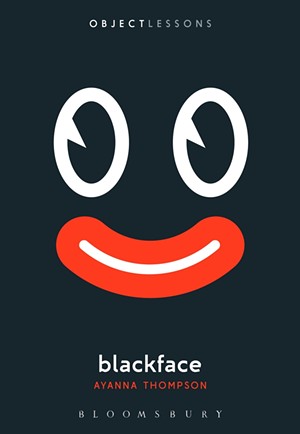Racism has dominated recent headlines amid conversations about police violence, domestic terrorism, and reparations for slavery. For Ayanna Thompson, the Arizona-based author of a new book titled Blackface, understanding the present moment requires exploring the past, including ways systemic racism is rooted and reflected in blackface performance.
She’ll be talking about the history of blackface and Black stereotypes, as well as contemporary manifestations from Hollywood films to American classrooms, during a virtual event with Changing Hands Bookstore on Thursday, April 22. It’s well-timed, given that the Academy Awards happen just a few days later, and nominated films include one incorporating blackface.
“A lot of the book centers around blackface performances in the 21st century,” Thompson says. “I want to combat the idea that this is something that only happened back then, during earlier times.” A case in point, she says, is Sacha Baron Cohen’s 2020 Borat Subsequent Moviefilm, which got two Oscar nods.
For Thompson, the film is problematic, despite the fact Cohen uses a 2001 image of Justin Trudeau wearing blackface as an Aladdin character to mock the practice of blackface performance. “The intentions of someone using blackface are irrelevant, because it always involves white people assuming they have the right to perform blackness.”
Defining blackface is helpful here, so people have a common understanding of the practice she’s addressing.
“For me, blackface is the appearance of any prosthetic that alters one’s race from one to another,” she explains. “It’s performing or appearing to be Black, whether you’re wearing a Halloween costume or playing Shakespeare’s Othello.”
It’s more prevalent than people realize, she says, recounting a long list of blackface performances during the last 20 years or so. “One of the things that shocked me was TV shows from 2008 to 2020, when you had a better chance of seeing blackface than seeing a Black performer.” As examples, she cites comedy bits by Jimmy Kimmel, Jimmy Fallon, and Sarah Silverman, plus sketches on Saturday Night Live.
Thompson recalls three episodes of 30 Rock that incorporated blackface while Barack Obama was president, plus Robert Downey Jr.’s performance in Tropic Thunder and Billy Crystal’s blackface performance while hosting the 2012 Oscars. “I think it was part of this idea that we were a post-racial society,” she says. “Comedians were rewarded for being edgy, so they folded blackface into their acts.”
Today, she’s working to raise awareness through her book, but also programs at the Arizona Center for Medieval and Renaissance Studies, where she serves as the director. She’s also a regent’s professor of English at ASU, where the center is located. Her foray into blackface research started with exploring the works of Shakespeare, as white male scholars accused her of using “incendiary language” when she called out the practice of white actors using blackface in theater and opera settings.
She’s hoping her book will reach a wider audience, helping readers understand the ways blackface past and present promulgates systemic racism. “People talk a lot about cancel culture; we should definitely cancel blackface.”
For the Changing Hands event, a conversation with journalist Steven Beschloss, Thompson will be sharing both personal and professional insights, including some of the experiences her children have had in Arizona schools.
“We need to be having frank conversations about why blackface is harmful,” she says, “and why we need to stop it.”
Ayanna Thompson: Blackface (Object Lessons), a virtual Changing Hands Bookstore event featuring the author in conversation with Steven Beschloss happens at 6 p.m. on Thursday, April 22. Get the book (with store pick-up) plus event ticket for $16.16 plus fees.
[
{
"name": "Air - MediumRectangle - Inline Content - Mobile Display Size",
"component": "18478561",
"insertPoint": "2",
"requiredCountToDisplay": "2"
},{
"name": "Editor Picks",
"component": "16759093",
"insertPoint": "4",
"requiredCountToDisplay": "1"
},{
"name": "Inline Links",
"component": "17980324",
"insertPoint": "8th",
"startingPoint": 8,
"requiredCountToDisplay": "7",
"maxInsertions": 25
},{
"name": "Air - MediumRectangle - Combo - Inline Content",
"component": "16759092",
"insertPoint": "8th",
"startingPoint": 8,
"requiredCountToDisplay": "7",
"maxInsertions": 25
},{
"name": "Inline Links",
"component": "17980324",
"insertPoint": "8th",
"startingPoint": 12,
"requiredCountToDisplay": "11",
"maxInsertions": 24
},{
"name": "Air - Leaderboard Tower - Combo - Inline Content",
"component": "16759094",
"insertPoint": "8th",
"startingPoint": 12,
"requiredCountToDisplay": "11",
"maxInsertions": 24
}
]













